

Boundless Psychology. Gender and Sociology From birth, children are assigned a gender and are socialized to conform to certain gender roles based on their biological sex. Learning Objectives Explain how gender roles shape individual behavior and how society punishes those who don’t conform Key Takeaways Key Points. Feminine Traits & Stereotypes. Our society has a set of ideas about how we expect men and women to dress, behave, and present themselves.
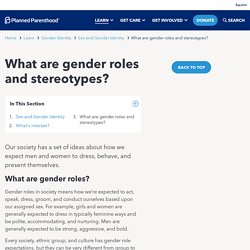
What are gender roles? Gender roles in society means how we’re expected to act, speak, dress, groom, and conduct ourselves based upon our assigned sex. Viewcontent.cgi?article=1000&=&context=soc_facpub&=&sei-redir=1&referer=https%3A%2F%2Fscholar.google. Gender Identity: Definitions, Development of Gender Identity - Usual Patterns, Development of Gender Identity - Unusual Patterns.
Conditions Resulting From Genetic or Hormonal Influences Changes to the usual process of fetal development cause numerous differences in the resulting fetus.
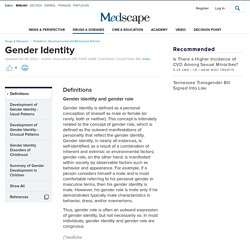
When levels of prenatal hormones are altered, phenotypic progression is also altered. The inherent brain bias toward one sex may be discordant with the genetic makeup of a fetus, or even with its external anatomic presentation. Wood._Eagly.Two_Traditions.2015. How Albert Bandura's Social Learning Theory Works. Learning is a remarkably complex process that is influenced by a wide variety of factors. As most parents are probably very much aware, observation can play a critical role in determining how and what children learn.1 As the saying goes, kids are very much like sponges, soaking up the experiences they have each and every day. Because learning is so complex, there are many different psychological theories to explain how and why people learn. A psychologist named Albert Bandura proposed a social learning theory which suggests that observation and modeling play a primary role in this process.2 Bandura's theory moves beyond behavioral theories, which suggest that all behaviors are learned through conditioning, and cognitive theories, which take into account psychological influences such as attention and memory.
Albert Bandura's Social Learning Theory. Albert Bandura's Social Learning Theory By Saul McLeod, updated 2016 Social learning theory, proposed by Albert Bandura, emphasizes the importance of observing, modelling, and imitating the behaviors, attitudes, and emotional reactions of others.
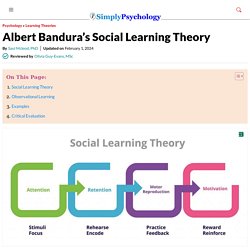
Social Learning Theory: Gender Development. Social Learning Theory states that individuals develop gender by imitating role models.
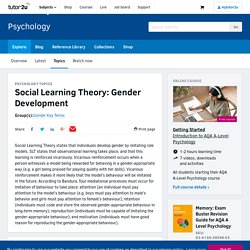
SLT states that observational learning takes place, and that this learning is reinforced vicariously. Vicarious reinforcement occurs when a person witnesses a model being rewarded for behaving in a gender-appropriate way (e.g. a girl being praised for playing quietly with her dolls). Bandura1969HSTR.pdf. When do children develop their gender identity? Gender is generally thought of as a stable trait: we are born male or female and we stay that way as we grow from small children to adults.
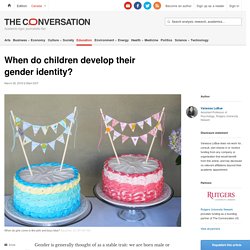
It turns out that for young children, initial concepts about gender are quite flexible. In my own research, I’ve found that children don’t begin to notice and adopt gender-stereotyped behaviors (e.g., preferring colors like pink or blue) until the age of two or three. A few years later, their concept of gender becomes quite rigid, and although it becomes more relaxed by middle childhood, even adults have trouble going back to thinking about gender as something that’s flexible.
So, how do children come to understand gender? When do they begin to think about gender as a stable trait? Children and gender identity: Supporting your child. Children and gender identity: Supporting your child Understand the importance of talking with your child about gender identity and expression — and how to get the conversation started.
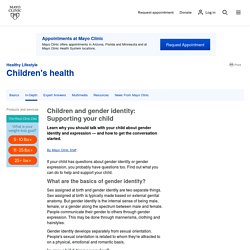
By Mayo Clinic Staff If your child has questions about gender identity or gender expression, you've probably got questions, too. Find out what you can do to help and support your child. What are the basics of gender identity? AS_AQB_gender_SLTBasics. Gender stereotyped parenting influences early child social development. Judi Mesman and Marleen Groeneveld at Leiden University in the Netherlands recently reviewed research on how parents influence children’s socialization to gender roles.

This conditioning of early childhood has long-term influences on children’s social development. Parents in Western societies generally deny that they stereotype their children by gender. Research has found that this is particularly true in more gender-egalitarian societies, where promoting gender stereotyping is more likely to be frowned on. When it comes to general parenting practices in early childhood – being warm, being sensitive and applying parental control – differences in the treatment of boys and girls are small. Viewcontent.